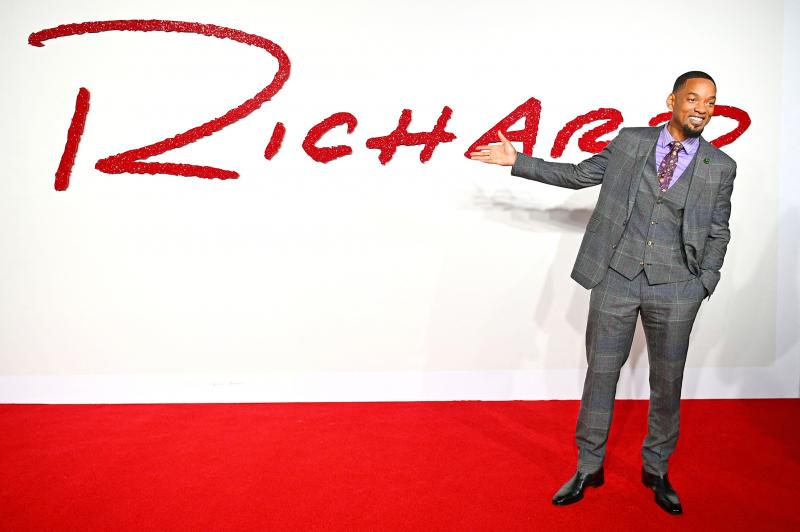Let’s be honest, King Richard is nowhere near being a favorite for best picture. Some would even suggest an unpretentious sports biopic like this doesn’t even belong at the awards top table. But isn’t that what they said about Venus and Serena Williams? King Richard is an underdog movie about underdogs, and if the notion of the lowly outsider overcoming daunting odds sounds too Hollywood to swallow, well tough: this actually happened.
Richard Williams’ story is absurdly improbable, on the face of it: a working-class Black man from Compton, Los Angeles, who decides he is going to coach his two daughters to become world-beating tennis players before they are even born, and writes an 85-page plan for how to achieve it. Needless to say, the pro tennis world laughs in his face.
“You’re asking me to believe you have the next two Mozarts living in your house.”

Photo: AFP
But of course, Williams does achieve his goal, and if the conclusion of this story is not exactly a cliffhanger, King Richard at least departs from the standard “everything depends on the big game” sports-movie formula, and gets into the psychology of this unique family.
An icon himself, Will Smith has to work hard to embody a potential loser, but this is his best dramatic performance to date. It’s quite a transformation: greying, stooping, weary and pained — nobody would mistake King Richard for a Fresh Prince. He’s a curious mix of humility and resolve, of compassion and stubbornness. He is unwavering in his conviction, and relentless in instilling self-belief in his daughters. Not everyone agrees with his approach: the Williams sisters themselves (Saniyya Sidney and Demi Singleton) seem remarkably compliant much of the time, but some of the movie’s best scenes are Richard’s exchanges with his wife Oracene (Aunjanue Ellis on excellent form), who presents a robust challenge to his tyrannical reign.
Race is inevitably a factor here, and the white-dominated world of tennis throws American prejudice into stark relief, not least the way in which Black talent is dismissed by white outsiders until it becomes potentially exploitable. As the Williams sisters’ brilliance on the court emerges, the way in which the attitudes of white coaches, agents and sponsors switch from snooty condescension to strategic grovelling is a dynamic only a movie like this can illustrate. When a coach insists to Richard that the sisters have only a tiny window of time in which to turn professional, he replies: “Peoples like us, we get shot when we go through those.”

Photo: AP
As counterbalance to these serious themes, King Richard smartly brings in a comedy wildcard half-way through, in the form of Jon Bernthal. As the sisters’ coach Rick Macci, he’s everything their daddy isn’t: cheerful, friendly, irrepressibly perky. Inevitably, he and Richard don’t always see eye to eye but he’s just what the story needs to pep it up.
You could well complain that King Richard is too generous towards its central figure, just as you could argue that the Williams sisters themselves deserve the real credit for their success, but Venus and Serena are the co-producers of the movie (along with Smith), and this is the story they wanted to tell. It is as much a story about parenting achievement as sporting achievement, which is far more useful to the wider world. Yes, it might be buffed by the rosy glow of hindsight and a little on-the-nose at times, but King Richard is too specific in its detail to devolve into cliche. It is an American dream that actually came true.

By 1971, heroin and opium use among US troops fighting in Vietnam had reached epidemic proportions, with 42 percent of American servicemen saying they’d tried opioids at least once and around 20 percent claiming some level of addiction, according to the US Department of Defense. Though heroin use by US troops has been little discussed in the context of Taiwan, these and other drugs — produced in part by rogue Chinese Nationalist Party (KMT) armies then in Thailand and Myanmar — also spread to US military bases on the island, where soldiers were often stoned or high. American military policeman

Under pressure, President William Lai (賴清德) has enacted his first cabinet reshuffle. Whether it will be enough to staunch the bleeding remains to be seen. Cabinet members in the Executive Yuan almost always end up as sacrificial lambs, especially those appointed early in a president’s term. When presidents are under pressure, the cabinet is reshuffled. This is not unique to any party or president; this is the custom. This is the case in many democracies, especially parliamentary ones. In Taiwan, constitutionally the president presides over the heads of the five branches of government, each of which is confusingly translated as “president”

An attempt to promote friendship between Japan and countries in Africa has transformed into a xenophobic row about migration after inaccurate media reports suggested the scheme would lead to a “flood of immigrants.” The controversy erupted after the Japan International Cooperation Agency, or JICA, said this month it had designated four Japanese cities as “Africa hometowns” for partner countries in Africa: Mozambique, Nigeria, Ghana and Tanzania. The program, announced at the end of an international conference on African development in Yokohama, will involve personnel exchanges and events to foster closer ties between the four regional Japanese cities — Imabari, Kisarazu, Sanjo and

Sept. 1 to Sept. 7 In 1899, Kozaburo Hirai became the first documented Japanese to wed a Taiwanese under colonial rule. The soldier was partly motivated by the government’s policy of assimilating the Taiwanese population through intermarriage. While his friends and family disapproved and even mocked him, the marriage endured. By 1930, when his story appeared in Tales of Virtuous Deeds in Taiwan, Hirai had settled in his wife’s rural Changhua hometown, farming the land and integrating into local society. Similarly, Aiko Fujii, who married into the prominent Wufeng Lin Family (霧峰林家) in 1927, quickly learned Hoklo (commonly known as Taiwanese) and